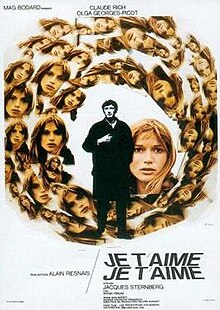Je t'aime, je t'aime
| Je t'aime, je t'aime | |
|---|---|

Film poster
|
|
| Directed by | Alain Resnais |
| Produced by | Mag Bodard |
| Written by |
Jacques Sternberg Alain Resnais |
| Starring | Claude Rich |
| Music by | Krzysztof Penderecki |
| Cinematography | Jean Boffety |
| Edited by | Albert Jurgenson Colette Leloup |
|
Release date
|
|
|
Running time
|
91 minutes |
| Country | France |
| Language | French |
| Box office | $3 million |
Je t'aime, je t'aime ("I Love You, I Love You") is a 1968 French science fiction film directed by Alain Resnais from a screenplay by Jacques Sternberg. The plot centres on Claude Ridder (Claude Rich) who is asked to participate in a mysterious experiment in time travel when he leaves hospital after a failed suicide attempt. The experiment, intended to return him after one minute of observing the past, instead causes him to experience his past in a disjointed fashion. His fate is left ambiguous.
The film was listed to compete at the 1968 Cannes Film Festival, but the festival was cancelled due to the countrywide wildcat strike that occurred in May 1968 in France. It won two awards – one for best actor, and the other many years later for "best rediscovery" in 2014 (Special Award of the Boston Society of Film Critics).
While seldom ranked among Resnais's best works, Je t'aime, je t'aime has received positive reviews since its release. Its synopsis has been cited as an influence on the 2004 Michel Gondry film Eternal Sunshine of the Spotless Mind.
Claude Ridder (Claude Rich) is leaving hospital after a failed attempt at suicide, when he is asked to participate in a mysterious experiment in time travel by a private research body. They have succeeded in sending mice back unharmed for periods of one minute, but need to send a human back to confirm the subject did actually revisit the past. Claude agrees, but instead of returning promptly as the mice had done, he re-experiences many episodes from his past in a highly disjointed and fragmented manner, in interludes of seconds or minutes.
Claude's observations culminate in his admission – which he later says he fabricated – that he had killed his depressed wife painlessly by gas poisoning, upon seeing her in her sleep – for the first time in her life – completely happy and without fear, and his attempted suicide upon then finding he could not live with, or without, her.
...
Wikipedia
